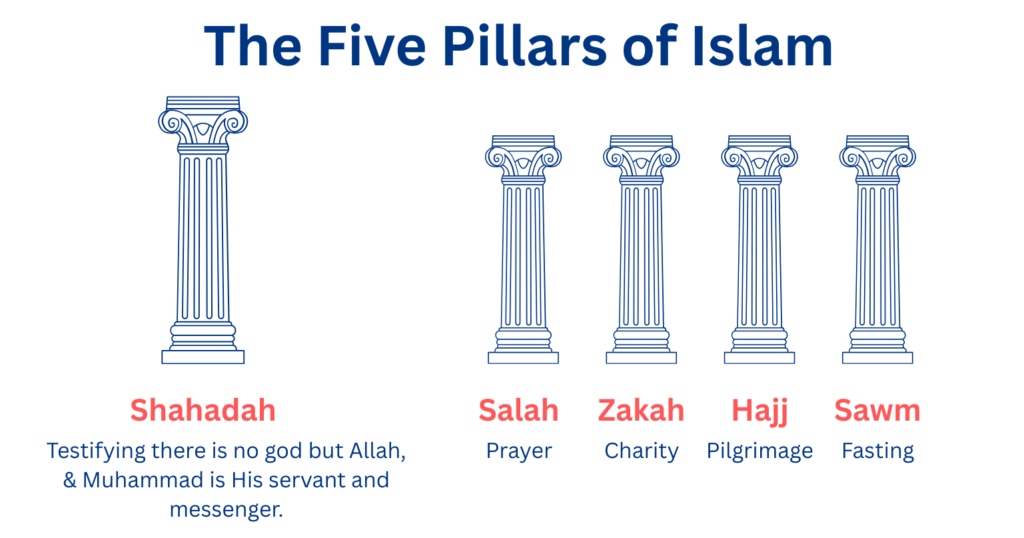Islam is a comprehensive way of life that guides Muslims in their actions, faith, and character. The five pillars of Islam, which form the foundation of the religion’s beliefs and practices, are central to this faith. A Muslim’s spiritual life cannot be steady without these five essentials, just as a house cannot stand without strong pillars. Each pillar plays a vital role in strengthening the believer’s relationship with Allah and others. When combined, they provide balance, self-control, and direction in everyday life.
1. Shahadah – The Declaration of Faith
The Shahadah or the declaration of faith is the first pillar of Islam. “There is no God but Allah and Muhammad (PBUH) is His messenger” is clear but meaningful phrase. This belief is core of Islam faith which declares that worshiping Allah alone and adhering to the teachings of Prophet (PBUH) should be the main priorities of one’s life. Words are not everything that the Shahadah is. One’s entire perspective on life is moulded by this commitment. Muslims declare oneness of Allah and vow to live in accordance with His instructions by saying and believing in the Shahadah. It is also the initial step for those who wants to convert to Islam. Faith is the foundation of all worship and practice, therefore without it, the other five pillars are meaningless.
2. Salah – Daily Prayer
The Salah or daily prayer is the second pillar of Islam and is offered five times a day. Salah serve as a reminder to Muslims that worship is not confined to a single day or one location. Because these prayers are offered at various times of the day—dawn, noon, afternoon, evening and night —believers can continue to focus on Allah even they have hectic schedules. Salah is a clear demonstration of Islam as a faith and practice. It calls for punctuality, honesty and self-control. Standing, prostrating and kneeling during Salah indicate obedience and loyalty. The Quranic recitation helps the believers to stay linked with the words of Allah. Salah is a spiritual restoration, not only a ritual. When performed in a congregation, it fosters harmony, reduces stress and strengthens ties among the community. It is among the five pillars most obvious expressions in everyday life.
3. Zakat –Obligatory Charity
Zakat or obligatory charity is the third pillar of Islam. Giving away a portion of one’s wealth, usually 2.5% of savings, to help people who are in need is mandatory for Muslims who meets the financial criteria. The goal of this practice is to promote social justice and cleanse wealth, not only about money. Zakat serve as a reminder to Muslims that money is a gift from Allah and must to be utilized sensibly carefully. Muslims exemplifies the virtues of compassion, charity and justice by helping the poor, supporting community projects and taking care of orphans. This pillar minimizes the status gap and strengthens the ties within the Muslim community. Zakat, a fundamental component of Islamic faith and practice, teaches that true success found in distributing wealth for the Allah’s sake rather than collecting it.
4. Sawm – Fasting in Ramadan
Sawm or fasting during Ramadan is the fourth pillar of Islam. Muslims avoid from eating, drinking and other body demands from dawn till sunset. Although it may seem difficult, there are several important spiritual advantages of this. Self-control, patience and thankfulness are developed through fasting. Muslims experience hunger and thirst as a reminder of hardships face by those who are less fortunate. By doing this practice, one’s compassion and relationship with Allah are strengthened. Ramadan is a time for both spiritual and physical development, with nights devoted to Quranic recitation and additional prayers. Giving up food is only one aspect, other aspects include avoiding from sinful behaviour and concentrating on worship. It enriches the follower’s practice of Islam and supports the principles of the five pillars.
5. Hajj – Pilgrimage to Makkah
Hajj, pilgrimage to Makkah is the fifth pillar of Islam. It must be done once in a lifetime by Muslims who are physically and financially capable. Muslims from all over the world gather at one place for the Hajj, wearing same dress, say same words and carrying out the same rituals, which makes it special. The hajj is a sigh of unity, equity and commitment. Acts are done by pilgrims such as Tawaf, Sa’i, and standing at Arafat. These rituals serve as a reminder of sacrifices made by Prophet Ibrahim (A.S), his wife and their son. The Hajj experience revolves around the lessons of patience, obedience and faith in Allah. Hajj transforms into life-changing journey for many.
The central place of the Five Pillars in Islam
The five pillars are significant in Islam. They teach Muslims how to worship Allah, how to maintain their religious ties and how to live their lives. Zakat, Hajj, Sawm, Shahadah and Salah all form a solid foundation of dedication and discipline. In additions to being rituals, five pillars serve as guiding principles. They affect family life, social interactions, individual character and community ties. These pillars work together to maintain a balance between practical duties and spiritual beliefs. They instruct Muslim to remember Allah in all aspects of life. Islam would not be unified or structured without them.
